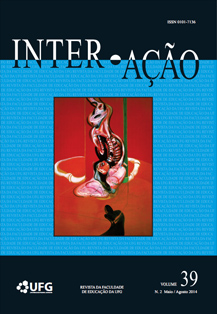PONTOS NODAIS PARA A FORMAÇÃO DO PEDAGOGO
DOI:
https://doi.org/10.5216/ia.v39i2.20902Palavras-chave:
Curso de Pedagogia, DCNP/2006, Recontextualização e Reformas Educativas.Resumo
RESUMO
Este artigo apresenta os resultados de uma pesquisa que analisou como Instituições de Ensino Superior têm elaborado os Projetos Políticos Pedagógicos (PPP's) de seus Cursos de Pedagogia a partir das proposições das DCNP/2006. Como metodologia de pesquisa foi utilizada a análise documental, das DCNP/2006 e dos PPP’s. A análise partiu de duas hipóteses iniciais, a saber: nas atuais propostas de formação há uma tendência de desintelectualização e as normatizações oficiais podem assumir uma expressão diferente da proposta por seus legisladores, amparada nos conceitos de “recontextualização” de Basil Bernstein e de “práticas gazeteiras” de Michel de Certeau. Fez-se necessário um resgate teórico das análises realizadas por diversos autores a respeito das influências inseridas no Curso de Pedagogia pelo contexto de reformas educativas desenvolvidas na década de 1990.
Downloads
Downloads
Publicado
Como Citar
Edição
Seção
Licença
A Inter-Ação utiliza como base para transferência de direitos a licença Creative Commons Attribution 4.0 para periódicos de acesso aberto (Open Archives Iniciative - OAI). Por acesso aberto entende-se a disponibilização gratuita na Internet, para que os usuários possam ler, baixar, copiar, distribuir, imprimir, pesquisar ou referenciar o texto integral dos documentos, processá-los para indexação, utilizá-los como dados de entrada de programas para softwares, ou usá-los para qualquer outro propósito legal, sem barreira financeira, legal ou técnica.
Autores que publicam neste periódico concordam com os seguintes termos:
1) Autores mantém os direitos autorais e concedem à revista o direito de primeira publicação, com o trabalho simultaneamente licenciado sob a Licença Creative Commons Attribution que permite o compartilhamento do trabalho com reconhecimento da autoria e publicação inicial nesta revista.
2) Autores têm autorização para assumir contratos adicionais separadamente, para distribuição não-exclusiva da versão do trabalho publicada nesta revista (ex.: publicar em repositório institucional ou como capítulo de livro), com reconhecimento de autoria e publicação inicial nesta revista.
3) Autores têm permissão e são estimulados a publicar e distribuir seu trabalho online (ex.: em repositórios institucionais ou na sua página pessoal) a qualquer ponto antes ou durante o processo editorial, já que isso pode gerar alterações produtivas, bem como aumentar o impacto e a citação do trabalho publicado.















